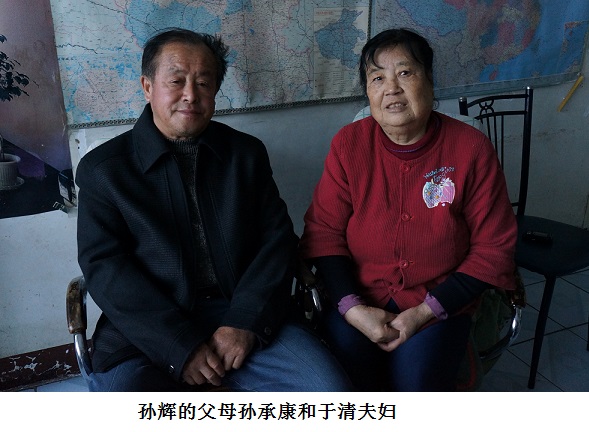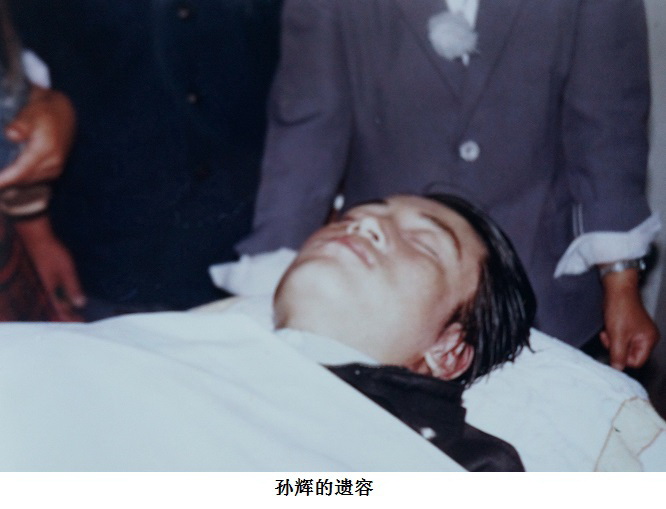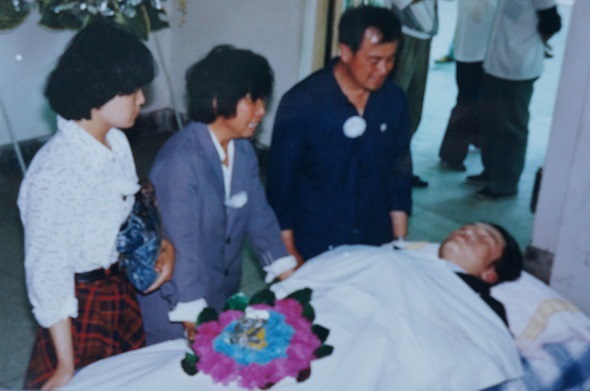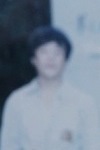[Translation by Human Rights in China]
In mid-November 2013, Guo Liying and I traveled to Henan, Hubei, and Jiangxi Provinces in central China to visit the families of victims of June Fourth.
We went first to Zhengzhou in Henan to visit Mr. Sun Chengkang and his wife Mrs. Yu Qing, the parents of Sun Hui, who was a first year student at Peking University when he died on June 4, 1989. The Suns now live with their daughter.
It took us just over two hours to get to Zhengzhou from Beijing by high-speed train. As we walked out of the train station, we saw Mr. Sun, his wife, and their daughter Sun Ning waiting for us. When we saw each other, we all felt that we should have met a long time ago. We all embraced warmly.
On our way to the Suns’ home, every time we mentioned Sun Hui, Sun Ning could not help crying. We could see she is someone with deep feelings. Sun Hui was the youngest of the Sun’s three children, and also the most loved by his parents.
The Sun’s family home is on the fourth floor of a building facing the street. Mrs. Yu Qing’s legs are not very agile. Walking up the stairs every day is very difficult for her, and she has to hold on to the rails.
In the afternoon, Guo Liying and I recorded an interview with them.

Sun Hui’s parents Mr. Sun Chengkang and Mrs. Yu Qing.
“My name is Sun Chengkang. Today, I’d like to talk about my son, Sun Hui. During the June Fourth Incident, my son was shot death by the People’s Liberation Army (PLA). I feel very bad about this. I am a veteran worker. In 1966, I answered the call of the Communist Party and Chairman Mao to support the Great Development of the Northwest and came to Ningxia[1] with my wife and my oldest son. In those days, Ningxia was sparsely populated, and life there was extremely difficult. But I didn’t have any complaints. I came from Benxi, in Liaoning Province, in the Northeast, where life was much easier. In those days, I was the secretary of the Communist Youth League’s branch in the Benxi coal mines. Under my leadership, people of the entire League’s branch went to Ningxia to participate in the Great Development of the Northwest.”
This family of three left their hometown in China’s Northeast without any hesitation.
The couple’s daughter Sun Ning and youngest son Sun Hui were born in Ningxia. Though life for this family of five was hard, the couple had a harmonious relationship, and their children were all smart, well-behaved, and good students. They were a family full of love and warmth that was admired by all.
The three children all tested into university. The older son attended Ningxia Medical College and is now president of a hospital in Ningxia. Their daughter went to Shenyang Architectural Institute of Technology, and now runs her own gardening and horticulture production company. She is a mother of two.
They always took great pride in their youngest son Sun Hui. He was an extremely smart boy and had always been a top student at school. When he was in his second year of high school, Mr. Sun suggested that Sun Hui take the university entrance examination to assess his academic level. He passed the exam and was admitted to Ningxia University. But he told his father that he wanted to spend one more year in high school so that he would be good enough to go to Peking University. Mr. Sun thought that his son had a point. He was still young and it would be great if studying for one more year would enable him to go to Peking University, one of China’s top schools. And it is in the nation’s capital, where all Chinese people wanted to be. Going to Beijing would also enable him to see more of the world.
Mr. Sun agreed with his son. Sun Hui did not disappoint. He passed the entrance exam the following year and was admitted by the Department of Chemistry of Peking University, becoming a student in the entering class of 1988.
“We were very happy that our son was admitted to Peking University. But less than a year later, the student protest movement started. My son participated in the peaceful sit-in. In the early morning of June 4, the students were dispersed. Sun Hui went to look for his schoolmates on his bicycle. When he was near Fuxingmen, he was shot to the ground for no reason whatsoever by the martial law troops. He was taken to the nearby Children’s Hospital by people in the street. But by the time he got there, he had already stopped breathing.”
Prior to my trip, I had read Looking for June Fourth Victims by Professor Ding Zilin,[2] which described how Sun Hui was shot to death:
At around 8 a.m. on June 4, 1989, Sun Hui got on his bicycle, left the university, and sped toward Tiananmen Square. He was entrusted by his classmates to look for their class monitor and a few other classmates, who had not returned to school after the students withdrew from the Square in the early hours of June 4. When he arrived at the Fuxingmen overpass, he ran smack into the martial law troops who were shooting madly at the crowds. He was not able to dodge the bullets. An evil bullet entered his left armpit, pierced through his heart, and went out his right armpit. He fell to the ground, his blood staining his t-shirt which was emblazoned with the characters “Peking University.” Afterwards, people commented that perhaps it was his eye-catching t-shirt that made him a target of the martial law troops. The troops sent into the capital to carry out the martial law were told that their mission was to quell the “riot” started by the university students in Beijing.

Sun Hui’s body.
“A few days later, we received a letter from Sun Hui’s classmates and a notice from his school. I went to his school with my sister, my daughter, and her classmates. When I saw his body in the freezer, my heart hurt so much. I had sent my son to study in the capital under the leadership of the Communist Party so that he could be nurtured and become a good person who would contribute to the building of the country. But instead, he died by the guns of the Communist Party. This is the greatest regret of my life and something that I can never accept.
“My boy was so smart that he could already pass the university entrance examination as a sophomore in high school. He also spoke good English and could communicate fluently with his foreign friends in Beijing. Another thing I regret is that he got into a school in Beijing. If he had attended other schools, this would not have happened.
“After I settled my son’s affairs, I returned to the coal mine. After some time, my neighbor told me that the local police station had asked them to watch our every move. I really couldn’t understand why they had to do that. They shot dead my son, and now they made us their surveillance target.
“In 1995, after I retired, I decided to leave the coal mines and go back to my hometown in the Northeast before moving to my daughter’s home in Zhengzhou, Henan Province. At the time, my son-in-law worked at the zoo. Soon after we arrived, their neighbors told us that the police station at the zoo, upon receiving instructions from above, came to them and told them to keep watch on us for any abnormal behavior. The neighbors told us that they were very angry about the surveillance on us. I thought to myself: ‘So many people died in the Tiananmen Incident and there still hasn’t been an explanation. I have devoted all my life to this country and my son was shot dead—and now we are being watched, and our home phone is being tapped, as if we have committed crimes. So the Communist Party is in fact behaving just like the Nationalists that they overthrew.’ I really don’t understand.”

Sun Chengkang, his younger sister and his daughter pay their last respects to Sun Hui.
Mr. Sun continued: “It’s been more than 20 years since my son died, and no one has ever cared about us. We wash our faces with tears every June Fourth anniversary. My wife’s health has deteriorated because of my son’s death. She has gone to many hospitals and seen many doctors. Every night she can’t sleep past midnight—she just paces back and forth in the house. Deng Xiaoping is dead, and there have been several different leaders since. But no one has given us an explanation for June Fourth. My son was shot dead for no reason whatsoever. And for no reason, we were put under surveillance as if we were counter-revolutionaries. To this day, we don’t know what crimes we have committed. Now that Xi Jinping is in power, I truly hope that he can pay some attention to our group and give us an explanation. Many family members of victims of the Tiananmen Incident have died. I am over 70 years old now.”
“How old are you now?”
“I am 72.”
“What about you?” I asked Mrs. Yu Qing.
“I’m 74 years old.”
“I know we won’t live very long. But I hope that we can know the truth about June Fourth before we die. My son was shot dead while riding his bike on the street. What crime did he commit? I appeal to all people with conscience, international friends, and peace-loving people of the world to give their support and attention to the families of June Fourth victims. We didn’t do anything to let the Communist Party down. I hope that the Communist Party would not put us under surveillance and control as if we were the enemies.”
“Do you believe it’s right for the Communist Party to wield its knives against its people?”
“I look at June Fourth this way. My son was only a student at the time. He was unarmed. How could they shoot at him with their machine guns? They all have parents and children. How would they feel if their children were shot dead for no reason at all? I think President Xi Jinping ought to understand this because his father, Xi Zhongxun, was once persecuted, and he himself was implicated because of his father. What did he feel? I hope President Xi can empathize with those of us who have lost their children. I am over 70 now. I am not afraid—if they want to kill me, they can kill me; if they want to arrest me, then arrest me.”
“Were your son’s ashes buried in Ningxia?”
“At the beginning, my son’s ashes were placed at the Baobaoshan Cemetery[3] in Beijing. Three years later, we took them back home to Ningxia. In 2008, when the government still had no intention of solving the June Fourth problem, we decided to bury him next to his paternal grandmother’s grave.”
“Next year will be the 25th anniversary of June Fourth. What do you expect the government to solve for us? How do you feel about the series of memorial events?” asked Guo Liying.
Mr. Sun said, “My son died so many years ago. Even though I live outside of Beijing, I know that during the Two Congresses[4] each year and prior to the June Fourth anniversary, we would make our voices heard. Our three demands—for truth, accountability, and compensation—are completely reasonable. But to this date, the government has not given us an answer. Our demands are like rocks that have sunk to the bottom of the sea. The attitude of the government is really disheartening. Therefore, I hope that during his term, Xi Jinping would take our demands into serious consideration and give us a very good closure.”
“Do you think the June Fourth massacre is a crime or a mistake?” I continued to ask, following up on Guo Liying’s topic.
“It’s a crime!” Mrs. Yu Qing said in a firm voice.
“The June Fourth massacre has been recognized as a crime by all of the world! Our loved ones had no guns, did not commit any counter-revolutionary acts. Our children were shot dead for no reason whatsoever, and then family members of the victims were put under surveillance. Isn’t this like holding a knife against the people?”
“They’re doing this to maintain stability and bolster political power. Do you feel that massacring people can solve problems?” I asked.
“More than 20 years ago they used massacre. Many people became scared and didn’t dare to utter a sound. But in our hearts we refuse to accept this. The stronger the oppression, the more powerful the resistance is. When conflict intensifies to a certain degree, it will explode sooner or later,” Sun said.
Translator's notes
[1] The Ningxia Hui Autonomous Region is in northwestern China.
[2] Looking for June Fourth Victims is an unofficial translation of 《寻访六四受难者》, published in 2009, in Chinese only.
[3] Translator’s note: Mr. Sun was likely referring to the Laoshan Cemetary near the Babaoshan Revolutionary Cemetary. The latter is reserved for high-ranking officials.
[4] Translator’s note: The annual sessions of the National People’s Congress and the Chinese People's Political Consultative Conference.
© All Rights Reserved. For permission to reprint articles, please send requests to: [email protected].
You Weijie (尤维洁) and Guo Liying (郭丽英) are members of the Tiananmen Mothers.
 Sun Hui (孙辉), 19, male, a student in the Department of Chemistry at Peking University. Shot to death in the early morning of June 4, 1989, near Fuxingmen. He was looking for his schoolmates after they had been dispersed by martial law troops.
Sun Hui (孙辉), 19, male, a student in the Department of Chemistry at Peking University. Shot to death in the early morning of June 4, 1989, near Fuxingmen. He was looking for his schoolmates after they had been dispersed by martial law troops.
Previously Issued